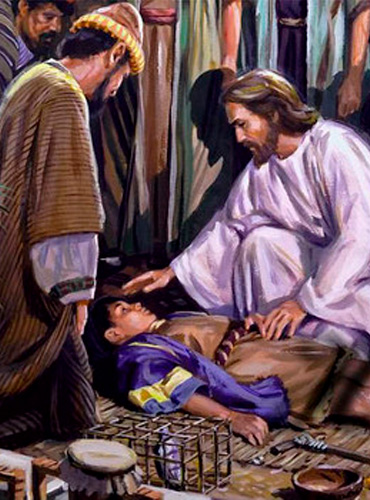Monday of the Seventh Week in Ordinary Time – Mk 9:14-29
Today’s Gospel presents a great deal to mediate on regarding the gift of faith, but we can focus on three points: the need not to be scandalized, the need to ask for the gift of faith, and the need for prayer.
First, there’s no need to be scandalized at the weaknesses and failings of others. Note what the father tells Jesus, knowing that Jesus is the miracle worker, this renowned healer who has been going around: “But if you can do anything, have compassion on us and help us.” Jesus repeats those first words back to him “If you can!,” and then gives the principle that the man should have applied: “Everything is possible to one who has faith.” On one hand, we can understand the father’s reaction. He had probably asked everyone with even an ounce of healing ability or some sort of minimal exorcist tendency to try to heal his son, and all had failed. Most recently, he had even asked the disciples, who had a reputation for success in earlier cases, and they too failed. This is why he approaches Jesus with such uncertainty. Yet, what bearing do the failings of all those other people have on Jesus’ abilities? Absolutely nothing. They in no way affect Jesus’ power, just as the failings of others have no bearing on the holiness of Christ. The number, importance, and gravity of the failings of those around us or in the Church at large, have no impact on Christ’s holiness. He remains the same yesterday, today, and forever, and hence our faith should remain unshaken.
Secondly, we can see our need for greater and deeper faith: it’s interesting that the father can speak normally about his son, but, when it comes to asking for faith, Mark tells us that the father “cried out” asking for it. Clearly, he wanted his son to be healed, but we shouldn’t think that there’s some quota of faith or minimum requirement that we need to meet, that with a certain amount of faith we’ll be ok. The father’s prayer should always be on our lips as well, as we cry out: “I do believe, help my unbelief!” We must always grow in our trust in God. In one of his letters, Saint John Bosco wrote: “If I had had a hundred times more faith than I do, I would’ve done a hundred times more than I did.” “If I had had more faith, I would’ve done even more.”[1] And this from a saint who spiritually directed many other saints, who built beautiful churches, was a gifted confessor, and saved thousands upon thousands of souls.
Thirdly, we can see the need for prayer and for our continual conversion. Notice that when Jesus is told of the situation, He doesn’t rebuke only the Apostles. Rather, His response, “O faithless generation!” is meant for all who hear; the real problem is not just one stubborn demon, but rather the lack of faith. His explanation to His Apostles in private, “This kind can only come out through prayer,” is a call to prayer and conversion, to a deeper communion with God. When Jesus sent out His disciples, He gave them power over demons. As with all things, the problem isn’t with Jesus or the Divine power, but with us, the instruments that impede God’s work.
Today, we can take some time to examine ourselves regarding faith: do we let ourselves be scandalized? Do we realize our need for deeper faith? Do we pray for this grace? Let us ask, through the intercession of Mary, Mother of Faith, for the grace to constantly turn to Christ and ask for His grace to become saints.
[1] “Si hubiese tenido cien veces más fe de la que tengo, hubiera hecho cien veces más de lo que hice.” (BAC, XVIII, 587).





